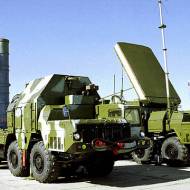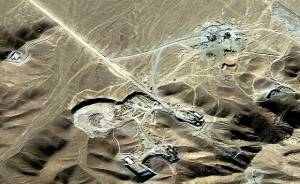

Iran’s nuclear plant at Fordo. (Al-arabiya)
Patrick Clawson, director of research at the Washington Institute for Near East Policy, said it was very peculiar the Iranians put the S-300 missile system at Fordo, a site they’ve long claimed would be impenetrable to attack.
On August 28, Iranian state television broadcast live images of Russian-made advanced S-300 surface-to-air missiles being transported by trucks to the Fordo nuclear facility south of Tehran. The move by Iran to further fortify one of its most secretive nuclear sites has led to questions over its intentions at the site, while also raising doubts about their commitment to the Joint Comprehensive Plan of Action (JCPOA) or Iran nuclear deal that was agreed to by Iran and the world powers last July.
During the weapons delivery, Iran’s Supreme Leader Ayatollah Ali Khamenei said in a speech, “Continued opposition and hype on the S-300 or the Fordo site are examples of the viciousness of the enemy. The S-300 system is a defense system, not an assault one, but the Americans did their best for Iran not to get hold of it.”
The S-300 was developed under the Soviet Union, and its newer variants are regarded as the most potent anti-aircraft missile systems in the world.
Russia began delivering the S-300 missile system last April, just months after many international sanctions were lifted against the Islamic Republic as a result of the nuclear deal.
Patrick Clawson, director of research at the Washington Institute for Near East Policy, said it was very peculiar the Iranians put the S-300 system at Fordo, a site they’ve long claimed would be impenetrable to attack.
“As per the nuclear agreement, very little is being done at Fordo,” he said. “So you have to scratch your head and wonder why the heck they did this at Fordo instead of Natanz [uranium enrichment plant], where, after all, there are 5,060 centrifuges and where they are not underground.”
The Fordo nuclear site, located 60 miles south of Tehran and built 300 feet below a mountain, was initially built in secret by Iran until satellite imagery forced the Islamic Republic to acknowledge its existence in 2009. In 2011, Iran told the International Atomic Energy Agency (IAEA), the United Nations nuclear watchdog, that it was planning to produce medium-enriched uranium, up to about 20 percent, at the site, which Western powers feared could be easily enriched into weapons-grade uranium.
Under the nuclear deal, Iran is not permitted to enrich uranium at the site for 15 years and its remaining 1,044 centrifuges allowed at the site will only by permitted for scientific research.
Elevated Suspicion
Ilan Berman, vice president of the American Foreign Policy Council think tank, said this move elevates suspicion over what Iran is doing at Fordo.
“This certainly raises questions over their transparency and what they are using the site for,” Berman said. “This move tells you this is an important strategic site for Iran and they have serious doubts that the military option [for the US or Israel] is not off the table.”
Berman added he thinks this is a good indication how fragile the Iranians think the deal is, and that Fordo matters a lot to them.
Iranian Brigadier General Farzad Esmaili, commander of the Islamic Revolutionary Guards Corps’ (IRGC) air defense force, told Iranian state TV recently that, “Our main priority is to protect Iran’s nuclear facilities under any circumstances.”
However, Esmaili did not indicate whether or not the system was yet operational, only adding: “Today, Iran’s sky is one of the most secure in the Middle East.”
Representative Lee Zeldin (R-NY), a member of the House Committee on Foreign Affairs, said, “This development begs the question that if Iran didn’t need S-300 surface-to-air missiles to protect Fordo before the Iran Nuclear Deal was implemented, why would it be necessary now? This is just further evidence that the unsigned ‘political commitment’ called the Joint Comprehensive Plan of Action (JCPOA) was not what it was hyped to be, unless, of course, you are Iran or Russia.”
Berman explained the real culprit here are the Russians, who see bolstering Iran’s defenses as a key part of their overall strategy in the Middle East.
“For Russia, which is relying on Iran for its campaign in Syria and more things, Moscow wants Iran more secure, not less,” he said. “A stronger Iran is better for them.”
The situation concerning the Fordo site comes amid further questions over the legitimacy of the nuclear deal with the P5+1 (US, UK, France, Germany, China and Russia) and Iran’s behavior.
The Deal
A report, released by the Washington-based Institute for Science and International Security on September 1, which based its information from several government officials involved in the negotiations, indicated the US and its international partners agreed “in secret” to allow Iran to evade certain restrictions in the landmark nuclear deal in order for the Islamic Republic to meet its Jan. 16 deadline for international sanctions relief.
“The exemptions or loopholes are happening in secret, and it appears that they favor Iran,” said David Albright, a former United Nations weapons inspector and co-author of the report, Reuters reported.
Among the exceptions outlined, two allowed Iran to exceed the deal’s limits on the quantity of low-enriched uranium (LEU), which can be used to make highly-enriched and weapons-grade uranium.
Additionally, a US Defense Department report in early August stated that Iran has gradually improved both its cyber abilities and developed more advanced ballistic missiles since the singing of the nuclear deal with world powers in July 2015.
The Islamic Republic now has a “substantial inventory of missiles capable of reaching targets throughout the region, including US military bases and Israel,” the Pentagon said in an unclassified summary, Bloomberg News reported.
The Washington Institute’s Clawson believes that Iran may have placed the missiles at Fordo as a political statement.
“Domestic politics is driving this more than anything else,” he said. “Their presidential election is coming up next year and this is a way for them to show how tough they are.”
Despite the move by Iran to bolster the defense at one of its most secretive nuclear sites, Berman does not believe the US or the international community will do much to confront this.
“We are going to let this pass just like we let the Russian use of Iranian airspace pass as well,” said Berman, referring to Russia’s move to conduct airstrikes in Syria from a military base in Iran.
“You are seeing a lot of disjointed policy. There is nothing to deal with a rapidly expanding Iran-Russia relationship either in the US or Israel,” he added.
By: Sean Savage/JNS.org
Do You Love Israel? Show Your Support!
Want to do something important for Israel? Make a donation to United with Israel, and help to educate and inspire millions around the world to support Israel too!
Now more than ever, Israel needs your help to fight the battle of public opinion. Israel’s enemies are using social media to incite brutal terror against innocent civilians. We need your help to fight back.
Help defend the truth about Israel to millions of people around the world. UWI also contributes to vital charity causes like building bomb shelters to protect Israeli citizens. Please show your support today!
Source: United with Israel

